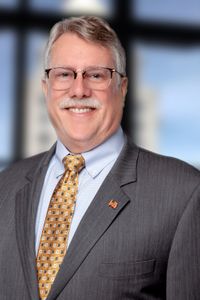Jeffrey Walter
Jeffrey Walter (Republican Party) is running for election to the U.S. House to represent Illinois' 11th Congressional District. He is on the ballot in the Republican primary on March 17, 2026.[source]
Walter completed Ballotpedia's Candidate Connection survey in 2025. Click here to read the survey answers.
Biography
Jeffrey Walter was born in Toledo, Ohio. Walter's career experience includes working as a consultant, plant manager, general manager, and senior manager. He served in the U.S. Navy from 1978 to 2000. Walter was elected as mayor of Elburn, Illinois in 2025. He earned a bachelor's degree from the University of South Florida in 1991, a graduate degree from the University of Toledo in 1997, and a graduate degree from New York Institute of Technology in 2004.[1]
Walter has been affiliated with the following organizations:[1]
- Elburn Lions Club
- American Legion Post 630
- Naval Cryptologic Veterans Association
- Naval Enlisted Reserve Association
- The Data Warehouse Institute
- University of Toledo Alumni Association
- University of South Florida Alumni Association
- Aurora Area Convention and Visitors Bureau
- Northwest Water Planning Alliance
- Metropolitan West Council of Governments
- Metropolitan West Council of Governments Legislative Committee
Elections
2026
See also: Illinois' 11th Congressional District election, 2026
General election
The primary will occur on March 17, 2026. The general election will occur on November 3, 2026. General election candidates will be added here following the primary.
Democratic primary election
Democratic primary for U.S. House Illinois District 11
Incumbent Bill Foster is running in the Democratic primary for U.S. House Illinois District 11 on March 17, 2026.
Candidate | ||
 | Bill Foster | |
 = candidate completed the Ballotpedia Candidate Connection survey. = candidate completed the Ballotpedia Candidate Connection survey. | ||||
| If you are a candidate and would like to tell readers and voters more about why they should vote for you, complete the Ballotpedia Candidate Connection Survey. | ||||
Do you want a spreadsheet of this type of data? Contact our sales team. | ||||
Withdrawn or disqualified candidates
- Tekita Martinez (D)
Republican primary election
Republican primary for U.S. House Illinois District 11
Tedora Brown, Charlie Kim, Mike Pierce, and Jeffrey Walter are running in the Republican primary for U.S. House Illinois District 11 on March 17, 2026.
 = candidate completed the Ballotpedia Candidate Connection survey. = candidate completed the Ballotpedia Candidate Connection survey. | ||||
| If you are a candidate and would like to tell readers and voters more about why they should vote for you, complete the Ballotpedia Candidate Connection Survey. | ||||
Do you want a spreadsheet of this type of data? Contact our sales team. | ||||
Endorsements
To view Walter's endorsements as published by their campaign, click here. To send us an endorsement, click here.
Campaign themes
2026
Ballotpedia survey responses
See also: Ballotpedia's Candidate Connection
Jeffrey Walter completed Ballotpedia's Candidate Connection survey in 2025. The survey questions appear in bold and are followed by Walter's responses.
| Collapse all
- I bring Proven, Results‑Driven Leadership - As a retired U.S. Navy Master Chief (E-9) and longtime Mayor of Elburn, I have delivered real outcomes through disciplined leadership. At Accenture, I led multi-million-dollar IT and AI modernization efforts across healthcare and telecom. As mayor, I modernized infrastructure, balanced budgets, strengthened public safety, and streamlined governance—showing he can get things done.
- I stand for and believe in Common‑Sense Governance for Our District - I bring practical, centrist leadership to Illinois’ diverse 11th District, blending suburban prosperity, farmland, and tech innovation. I am committed to fiscal responsibility, low taxes, and strategic growth—focusing on what works, not politics.
- I bring a Service‑First Vision for Illinois Families Rooted in my own service—from the Navy to local governance—I understand the value of opportunities and giving back. I also stand for accountability, protecting freedoms, and defending your tax dollars. Loyal to community first, not ideology.
Film: "Mr. Smith Goes to Washington" (1939) - This is for sure an idealistic but grounded view of a principled public servant challenging a broken system. It captures my mission of bringing service-minded, transparent leadership to Congress.
Integrity – Honesty and accountability must guide every decision and action.
Transparency – Open communication builds public trust and fosters civic engagement.
Service Mindset – Public office is a responsibility, not a privilege—serving the people must come first.
Fiscal Responsibility – Stewardship of taxpayer dollars is essential to good governance.
Pragmatism – Solutions should be grounded in reality, not ideology.
Courage – Standing firm for what’s right, even when it’s unpopular, is the mark of a true leader.
Respect for the Constitution and Rule of Law – Upholding the democratic process and individual rights is non-negotiable.
I approach challenges with transparency, fiscal discipline, and a service-first mindset. I am committed to listening carefully, building consensus, and acting decisively to deliver results that matter. My years as Mayor of Elburn have sharpened my ability to solve problems, manage resources responsibly, and work collaboratively across political lines to achieve community goals.
1. Representation & Constituent Service - A Congressman serves as the voice of their district—bringing constituents' concerns to Washington, helping navigate federal agencies, and advocating for local needs.
2. Legislation & Lawmaking - Congress members propose, review, amend, and vote on legislation. They also guide policy ideas from concept to law while balancing constituent interests with national priorities.
3. Oversight & Investigation - Part of the job involves overseeing the executive branch—conducting hearings, investigating issues, and ensuring government accountability to uphold the rule of law.
As an individual, my legacy must be broader than any title I’ve held. I want to be remembered as someone who valued family, faith, and community above self-interest. As a father, husband, and neighbor, I want to have modeled kindness, empathy, and responsibility. As a veteran, I want to leave an example of duty and sacrifice for a cause greater than oneself. As a mayor and local leader, I want people to say I left my community stronger, more connected, and better prepared for the future.
What has made the difference for me has been discovering the power of acupuncture and Traditional Chinese Medicine. Where traditional methods sometimes fell short, these therapies offered me a holistic path to balance. Through acupuncture, I found calm and clarity in moments that previously felt overwhelming. Sessions helped settle the internal noise, allowing me to approach tasks and decisions with a steadier mind. Traditional Chinese Medicine, with its emphasis on treating the body and mind as a unified whole, gave me new tools to address ADHD not as a flaw to suppress but as an imbalance to be guided back into harmony.
Over time, these therapies helped me regain control of my focus, sharpen my energy, and quiet the restlessness that once defined my days. They didn’t erase ADHD—it is still part of who I am—but they transformed it from an obstacle into something I could manage with dignity and strength.
The House also holds specific constitutional powers that distinguish it from other branches and chambers. It has the exclusive authority to initiate revenue and appropriations bills, placing it at the heart of the nation’s fiscal policy. This role gives the House direct responsibility for determining how taxpayer dollars are raised and spent, reinforcing its accountability to the people who provide those resources.
Additionally, the House plays a key role in the system of checks and balances, with the power to impeach federal officials and conduct rigorous oversight of the executive branch. This oversight function is essential for maintaining government transparency, ensuring accountability, and protecting the integrity of our democratic institutions.
Prior service in government or politics also fosters strong relationships with key stakeholders—other lawmakers, staff, agencies, and community leaders—which can be essential for getting things done. These connections make it easier to find allies, build bipartisan support, and secure resources for district needs. In many cases, representatives with prior experience are better positioned to advocate for their constituents from day one, without the steep learning curve that often slows new members.
Experience also helps representatives anticipate and address unintended consequences of legislation. Having previously worked within regulatory, budgetary, or policy frameworks allows them to foresee potential challenges and craft more practical, durable solutions. Additionally, seasoned officials often have a proven track record of accountability, fiscal responsibility, and responsiveness, giving voters confidence in their ability to represent them effectively.
1. National Debt and Fiscal Stability - With rising interest costs and unfunded liabilities, the U.S. must confront long-term fiscal sustainability. Balancing budgets, reforming entitlements, and ensuring responsible spending are critical to prevent economic instability.
2. Global Competition and National Security - Rising threats from adversaries like China and Russia, along with cybersecurity and energy security concerns, will require strong defense policy, modernized armed forces, and strategic alliances to protect American interests.
3. Preserving Free-Market Principles Amid Expanding Government Control -
A growing push for left-wing socialist policies—such as government-run healthcare, universal basic income, and expanded federal control over industries—poses a challenge to the American free-market system. These policies risk stifling innovation, discouraging personal responsibility, and increasing dependency on government. The U.S. must defend economic freedom, personal liberty, and limited government to ensure continued growth, opportunity, and self-determination for future generations.
4. Technological Change and AI Governance - Rapid advancements in AI, automation, and biotech will reshape industries and the workforce. The U.S. must lead with ethical innovation, data privacy protections, and education to remain competitive and secure.
5. Restoring Trust in Government and Institutions -
Longer terms could also provide greater stability in the House’s composition, giving committees and legislative teams more continuity. That stability helps foster deeper institutional knowledge and expertise, enabling Congress to address complex issues more effectively.
Additionally, a four-year term could reduce the outsized influence of special interests. Because fundraising needs would be less constant, members could spend more time engaging directly with constituents and working on substantive policy rather than courting donors.
Critics might argue that longer terms reduce accountability, but regular elections for all members every four years would still give voters the power to hold representatives responsible. And with staggered elections—similar to the Senate—voters could still influence the makeup of the House at regular intervals.
These leaders—and I—share a common thread: we learned leadership from the ground up. Military service taught us discipline, accountability, and the importance of working as a team toward a mission. But our service didn’t end when we took off the uniform. Like Coffman and Womack, I took those lessons into local government, serving as Mayor of Elburn, Illinois. There, I oversaw smart growth, strengthened public safety, modernized governance, and invested in infrastructure—proving that principled, results-oriented leadership works at any level.
This blend of enlisted military experience, local executive leadership, and real-world problem-solving is rare in Congress—but it’s exactly what our nation needs. We know the value of service before self. We understand both the needs of our communities and the realities of global threats. And we have the practical, tested leadership skills to cut through political gridlock and deliver results.
In addition, my service on the Patient Family Advisory Council at one of the two VA hospitals in the Chicago area has given me firsthand insight into systemic challenges—long wait times, dropped calls, and what appeared to be an inefficient care delivery system.
My career has reinforced this belief. As Mayor of Elburn, I worked with trustees of different political perspectives, neighboring municipalities, county officials, and community stakeholders. We didn’t always agree on every detail, but we built consensus to pass budgets, approve infrastructure projects, and enhance public safety. This collaboration resulted in tangible successes—investments in roads and sidewalks, a safer community, and responsible fiscal management—because we focused on the problem, not the politics.
In the military, compromise took the form of mission-oriented cooperation. Diverse teams with different specialties, experiences, and viewpoints came together to execute complex operations. Success depended on mutual trust, clear communication, and a shared commitment to the mission, even when individuals had different approaches.
If elected, I would treat this constitutional responsibility as both a privilege and a duty. Control over revenue bills means the House has the first say in determining how taxpayer dollars are raised and, by extension, how they will be spent. I would use this authority to advance my core priorities: fiscal responsibility, transparency in government spending, and ensuring that every dollar serves a legitimate public purpose. That means opposing unnecessary tax increases, scrutinizing federal programs for waste, and redirecting resources toward areas that directly benefit the American people—such as infrastructure, veterans’ care, and national defense.
If elected, I would advocate for the House to use its investigative authority with precision, fairness, and a focus on results. Investigations should be driven by facts, not partisan agendas, and should target areas where there is credible evidence of waste, fraud, abuse, corruption, or inefficiency. This means demanding clear answers from federal agencies, ensuring compliance with laws, and holding leaders accountable for how public funds are managed.
For example, the House should rigorously examine how the Department of Veterans Affairs delivers healthcare, identifying systemic delays, inefficiencies, and barriers that keep veterans from receiving the benefits they earned. It should also investigate federal spending programs to ensure that every dollar is used effectively and in line with legislative intent.
House Republican Caucus Chair and State Representative Jeff Keicher
State Representative Dan Ugaste
Kane County Sheriff Ron Hain
Maple Park Mayor Chris Rebone
Gilberts Mayor Guy Zambetti
Hampshire Mayor Mike Reid
Wayne Township Supervisor & DuKane ABATE Vice President Randy Ramey
Elburn Trustee and DuKane ABATE President Chris Hansen
Lily Lake Mayor Kelly Diehl
Elburn Trustee Matt Wilson
Huntley Mayor Tim Hoeft
Elburn Trustee Addam Gonzales
Kane County Board Member Rick Williams
Elburn Trustee & Candidate for Kane County Sheriff Lou Santoyo
Elburn Trustee John Bolger
2. House Committee on Energy and Commerce - I bring extensive expertise in healthcare technology, AI, data governance, and telecommunications. This committee covers health policy, broadband, emerging tech, and energy policy—all relevant to my private-sector leadership.
3. House Committee on Oversight and Accountability - With my strong belief in 100% government transparency and track record of fiscal responsibility as mayor, this committee would empower me to investigate government inefficiencies and advocate for integrity and accountability.
4. House Committee on Transportation and Infrastructure - As mayor, I have overseen smart growth, infrastructure expansion, and regional development. My local governance experience gives me practical insight into how federal infrastructure policy impacts communities.
5. House Committee on Armed Services - My long military career would be a strong asset in shaping national security and defense policy, supporting service members, and overseeing the Department of Defense.
Note: Ballotpedia reserves the right to edit Candidate Connection survey responses. Any edits made by Ballotpedia will be clearly marked with [brackets] for the public. If the candidate disagrees with an edit, he or she may request the full removal of the survey response from Ballotpedia.org. Ballotpedia does not edit or correct typographical errors unless the candidate's campaign requests it.
Campaign website
Walter's campaign website stated the following:
Jobs & the Economy
Jeff believes in rebuilding the strongest economy in the world. As a businessman and Navy veteran, he knows we must unleash American energy, cut red tape, and bring back good-paying jobs. Jeff trusts President Trump—who already delivered one of the greatest economies in history—to do it again, and he supports Trump’s America First economic plan, including tariffs that protect American workers.
Lower Taxes & Cost of Living
Families are hurting under Biden’s inflation, high gas prices, and crushing grocery bills. Jeff supports making the Trump tax cuts permanent, lowering costs for families, and rooting out the fraud and waste in Washington that drive up prices.
Law & Order
Safe communities are the foundation of prosperity. Jeff supports fully funding law enforcement, ending soft-on-crime policies, and making sure criminals are held accountable.
Border Security & Immigration
Biden’s open border created chaos. Jeff will work with President Trump to continue to secure the border, finish the wall, and stop the flow of fentanyl and other drugs into America.
Protecting Seniors
Jeff will never cut Social Security or Medicare. Our seniors worked hard for these benefits, and they must be protected.
American Strength Abroad
Jeff supports Trump’s approach to foreign policy: peace through strength. He trusts President Trump, the best dealmaker to ever sit in the Oval Office, to negotiate peace in places like Ukraine while keeping America first.
Accountability in Washington
Washington wastes too much of your money. Jeff will fight to eliminate fraud and waste, cut reckless spending, and put government back on the side of taxpayers.
— Jeffrey Walter's campaign website (February 26, 2026)
Campaign finance summary

See also
2026 Elections
External links
Footnotes










